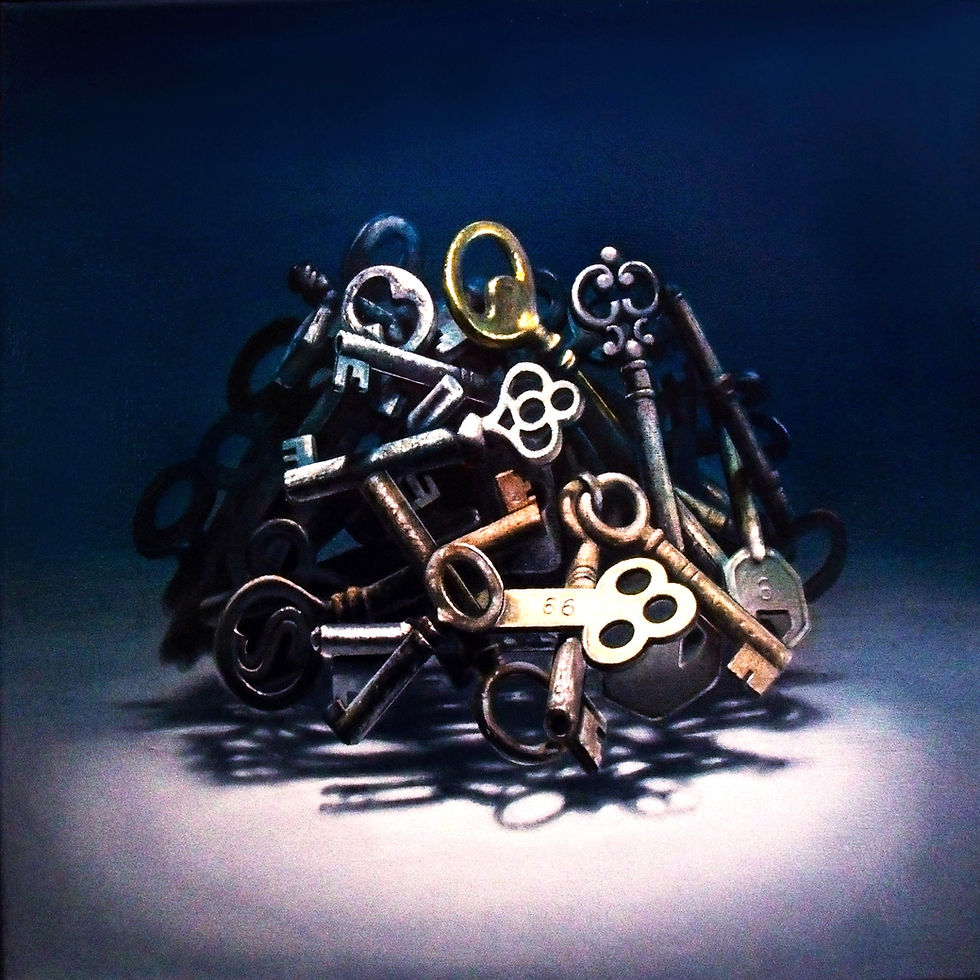Meeting the Wizard Of Oz
- Phil McLoughlin

- Jun 2, 2020
- 4 min read

Fifty years ago, under the influence of British pop art and the American ‘hard edge’, I felt that painting still had the power to change the world as we experienced it. Then, in August 1970, I stepped inside ‘Strategy Get Arts ‘ in Edinburgh and that belief collapsed within me. The clever palindrome in the title was key to an exhibition in which my idea of art was turned back to front, if not upside down. Nothing was, exactly, what it appeared to be. There were a few shock tactics but most exhibits generated moments of disquiet, confusion, disorientation and simple amazement. All were unforgettable.
‘Strategy Get Arts’ was jointly curated by Richard Demarco who, a few years later, helped me show my own work (as Phil Barker) at the St Andrew’s Festival. In a dimly-lit hall adjacent to the Crawford Arts Centre I mounted my first big installation:“Be-attitudes and Arti-facts”. Outside, the quadrangle became the focus for my first ‘performance’. Over five afternoons I spent several hours trying to shepherd several hundred polystyrene chips, with a broom, into a square marked out on the ground. The piece was untitled but, given the fickle St Andrews winds, might have been called futility.

After my encounter with the Düsseldorf artists in Edinburgh I spent a decade nurturing my own idea of conceptual art. One of my last works was in 1979 with the Dundee project: ‘Junk into art – art into junk’. This involved making ‘artworks’ from discarded materials and de-constructing them again. A life-cycle of sorts.
I chose the detritus from a jute mill as my raw material. I had spent a couple of years working in a mill and had a close connection to the smell and feel of the hanks of raw jute – not always a positive one. My core conceptual theme was emerging: ephemera - nothing lasts!
The next year the tide of my life turned. I was commissioned to write a book and had become increasingly committed to my doctoral research. It was time to take a break from the world of art. This interlude would last for 30 years.
People continued to paint and exhibit paintings but, 30 years on, the vanguard was dominated by the descendants of ‘junk into art’. Installations, performance and other forms of conceptual art, had become mainstream. What once was ‘radical’ had become convention. Nothing lasts!
I realised that the ‘conceptual’ phase of my life was gone. Like Theseus’ ship, the intervening years had changed, replaced and substituted every element that made up the ‘Phil Barker’ behind those works. I still felt something of the person I had been all those years ago, but I knew that this was a mythical self. I might still be the captain of my life but the ship had changed irrevocably, as had the captain.
Of course, all this was obvious to Heraclitus, who discussed the ‘ship of Theseus’ concept two and a half thousand years ago. I could never stay the same person. Change is inevitable. ‘everything flows’. I could never go back or reconnect. I could not step into the same river twice.
If I wanted to be radical I needed to be led by the root of the creative urge: ignore the fads and fashions of ‘contemporary art’; continue following the stream of my own life. If there was any point to art, or meaning in being an artist, it would be found in the flow of my time.
Such ideas do not fit comfortably with us today where life is ‘a project’. The art world is dominated by critics, connoisseurs and collectors who tell us what is (and is not) ‘good art’. People go to schools and colleges to study art, have their work critiqued, examined and assessed, all with a view to gaining a certificate confirming their status as an artist. All reminiscent of what the Wizard of Oz said to the scarecrow: “Back where I come from (men) think deep thoughts and with no more brains than you have. But they have one thing you haven't got: a diploma.”
In Rainer Maria Rilke’s view, the key to making any art comes from within. When a young poet asked him to criticise his work he said:
“You are looking outside…….. No one can advise or help you - no one. There is only one thing you should do. Go into yourself. Find out the reason that commands you to write...ask yourself in the most silent hour of your night: must I write? Dig into yourself for a deep answer.
Of course, the question arises: how long will this take? Rilke’s answer may be hard to swallow:
“Being an artist means: not numbering and counting, but ripening like a tree, which doesn’t force its sap, and stands confidently in the storms of spring, not afraid that afterward summer may not come. It does come. But it comes only to those who are patient, who are there as if eternity lay before them,... silent and vast. I learn it every day of my life, learn it with pain I am grateful for: patience is everything!
Later, another great artist would echo the sentiment: “no guru, no method, no teacher.”
Amen to that!
Phil McLoughlin 2020




Comments